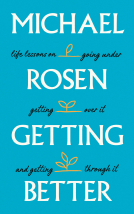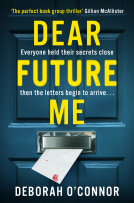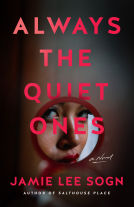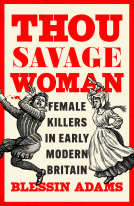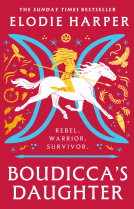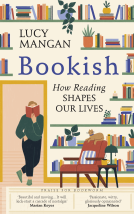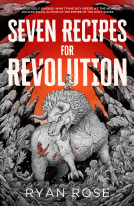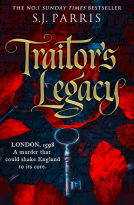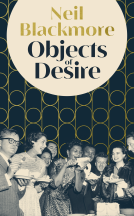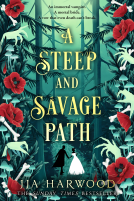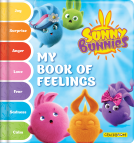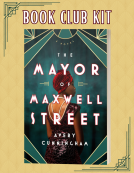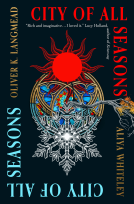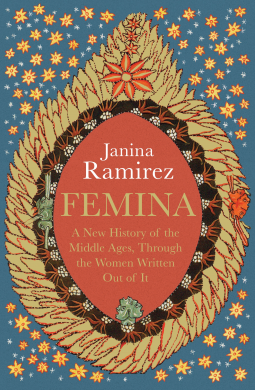
Femina
The instant Sunday Times bestseller – A New History of the Middle Ages, Through the Women Written Out of It
by Janina Ramirez
This title was previously available on NetGalley and is now archived.
Send NetGalley books directly to your Kindle or Kindle app
1
To read on a Kindle or Kindle app, please add kindle@netgalley.com as an approved email address to receive files in your Amazon account. Click here for step-by-step instructions.
2
Also find your Kindle email address within your Amazon account, and enter it here.
Pub Date 21 Jul 2022 | Archive Date 1 Sep 2022
Talking about this book? Use #Femina #NetGalley. More hashtag tips!
Description
++ Files available from May 15th 2022 ++
Extraordinary women have held positions of power throughout history. But, aside from the select few, why do we not hear about them?
The middle ages are seen as a bloodthirsty time of Vikings, Saints and Kings: a patriarchal society that oppressed and excluded women. But by digging a little deeper into the truth, drawing on evidence from all disciplines, we can see that the 'dark' ages were anything but. BBC historian Janina Ramirez has uncovered countless influential women's names struck out of historical records, with the word FEMINA annotated beside them. Male gatekeepers of the past ordered books to be burnt, artworks to be destroyed, and new versions of myths, legends and historical documents to be produced, which has manipulated our view of history.
By weaving a vivid and evocative picture of the lives of the women who influenced their society, we discover not just why these remarkable individuals were removed from our collective memories, but also how many other misconceptions underpin our historical narratives, altering the course of history, upholding the oppressive masculine structures of their present, and affecting our contemporary view of the past.
Available Editions
| EDITION | Other Format |
| ISBN | 9780753558256 |
| PRICE | £22.00 (GBP) |
| PAGES | 384 |
Featured Reviews
As a fan of Ramirez's appearances on the You're Dead To Me history podcast and someone with a pre-existing interest in women in medieval history, I was predisposed to like this book- however, there's so much to recommend it beyond just the authour and subject matter. Femina is a lively and engaging catalogue of remarkable women from the middle ages, from the Birka Warrior Woman to Jadwiga of Poland. I knew very little about all of them going in except their names and the broadest sketches of their lives- what Femina gave me was a thoughtful and balanced look at these women that took into account their context and the way they reflected it, as well as using them to then question our assumptions about that context.
I think, for me, that's the biggest selling point of Femina. It is, at heart, a very honest book. Ramirez has no interest in 'girlbossifying' any of these women. She takes pains to present them in all their complexity and dismisses easy answers in favour of a more nuanced approach. For example, in the chapter on Hildegard von Bingen, Ramirez points out how this medieval mystic had a lot of support from those around her, and encountered sympathetic male listeners as often as she did misogyny. She also underlines that this in no way makes the achievements of Hildegard, or any of her other subjects, less remarkable.
This is refreshing and helps us to see the medieval period as one not unlike our own, where people have a mix of beliefs and assumptions, some of them contradictory. The past is not a monolith- and by using the stories of these women, Ramirez demonstrates this ably.
 Media/Journalist 606767
Media/Journalist 606767
I've been waiting for a long time to read this book! 'Femina' is part social history, part reappraisal and an entirely clear-eyed evaluation of life in the West during the Middle Ages as seen through the eyes of select women. Ramirez ably balances archaeology, theory, biography and art, but her words really come to life as she tells stories and sets scenes. Those who already know about Hildegard von Bingen and Margaery Kempe will find fresh ideas, and there are plenty of surprises to keep potential medievalists entertained.
 Reviewer 997411
Reviewer 997411
*Thank you so much to netgalley and the publisher for an arc in exchange for an honest review.*
One of my favourite genres is books centering forgotten female stories and figures, and this is exactly what Ramírez has written in Femina.
As she puts it in the author's note, "I am not here to convince you that it is high time we put women at the centre of history. Many have already done that." And she is correct, because thousands of women have tried and for the most part, begun to succeed. What is necessary, rather, is that these women have their stories told and remembered.
Femina examines case studies of women from throughout the early ages by analysing artifacts, providing contextual information and interspersing the text with vivid descriptions to bring the ancient women to life. In 9 chapters, Ramírez expertedly weaves an astounding narrative firmly explaining how, if not wrong, but distorted modern history truly is.
The amount of male figures who simply wouldn't, or even didn't, accomplish what they've been credited without a woman's intervention for was ridiculous. It seems absurd that these powerful icons could just be forgotten.
That's what really makes Femina stand out.
A second reason for this is Femina gives a reason for this revisionist history we learn today. We all know WHO rewrote history (men) and WHAT they rewrote (anything featuring a powerful woman) but why? And how? Femina examines this point carefully.
My only criticism would be that the book is heavily focused on central and western Europe, I think a broader scale would be great.
From medieval queens, to Viking warriors, Ramírez truly does shine a light into the inner workings of the pre modern ages. I think this should be essential reading for anybody, of any age, learning history.
I reviewed Femina by Janina Ramirez for book recommendation site LoveReading.co.uk
I’ve chosen it as a LoveReading Star Book and Liz Pick of the Month.
Please see the LoveReading site for the full review.
I couldn’t resist this book, particularly when it feels like the gains made by feminism are being eroded and this book highlights the amazing women of the middle-ages who have been wiped clean from the history books.
I received a copy of this book for a free and unbiased opinion.
This book is a passionate discussion of the role women played in the middle-ages and made me reassess my own assumption that women played no role except to marry and have children and had no voice. But as the author describes this is perhaps a Victorian concept.
The author focuses on a few women – some known and some unknown- carefully presenting her evidence and explanation as to why these women were amazing.
She starts with the unknown warrior woman found buried in Loftus, North Yorkshire buried with her weapons and the world’s continued disbelief that women could fight to Jadwiga, a powerful Monarch whose husband seemed to be remembered by history more than her.
The author presents her facts in a highly enjoyable way, I never felt I was reading a boring old history book and at times it was like I was reading my favourite historical fiction. The book is never preachy and the author’s passion for the subject shines through.
My only minor criticism ( and more than I wanted to read more) is that it focuses on European history and would have loved to read about more amazing women around the world.
Perfect for anyone
Who loves books on less described aspects of history and those who love a feminist twist in their history.
 LOIS E, Educator
LOIS E, Educator
A novel. look at history with a new light on influential european women. The book is expertly crafted,
showing us their contributions in church, administration, social status and politics. The women were always
there- just hidden
The book is written in a stylish manner and is a compelling read. I enjoyed the observations immensely..
A well-researched factual page-turner..
Femina is an exploration of great medieval women, some I’d heard of, others I hadn’t. It’s a familiar period of history for me, but looked at from a usually overlooked feminine standpoint. I enjoyed the author’s enthusiastic voice guiding me and introducing me to some of her favourite people.
The book is well illustrated and referenced, recommended for any general reader as well as those more interested in medieval history.
 Leela C, Educator
Leela C, Educator
I have long been a fan of Janina Ramirez's television documentaries and am so grateful to receive an ARC of her superb upcoming book Femina. This much-needed piece of scholarly work provides insight into the incredible women who have been long-ignored by male scholars -- from women behind the Bayeux tapestry to medieval female entrepreneurs. The abundance of photographs of historical objects is very helpful, although they would have been so much nicer in full colour rather than black and white. I will certainly be recommending this book to students who enjoy exploring history beyond the curriculum and are curious to learn more about the overlooked role of women through the ages!
Femina is long overdue. Finally, a history book with the women put back in!
This was really refreshing and I loved the style of writing. It is a genuine page-turner and very accessible, but not dumbed-down.
I loved this book. So many women I had never heard of before, and they had such important and influential lives. An eye-opener of a book which is also really enjoyable to read.
Dr Ramirez is an incredibly engaging presenter on her television programmes so I was excited to read this book by her. From the outset it is structured in an exciting way, taking the artefacts and grave goods associated with particular women from history and exploring their lives and the contexts of other women of the same time in a case study type approach. I haven't seen a history book that follows this format before, but I think it works.
The facts are presented straightforwardly, making this a book that even those not interested in history in an academic sense will be able to engage with. Unlike some other books that focus on historical women, it doesn't try to make the women more 'exciting' or glamorous than they really were, which actually makes them more interesting, not less. The book focuses on the medieval/Middle Ages period which isn't an area I am particularly knowledgeable about but I felt like I gained a deeper understanding of women's lives during this period.
There is a nice range of women included, across different social classes in society with a focus on Western historical contexts. The imagery contained within also serves to effectively enhance the examples provided. Overall a fantastic piece of work and I look forward to reading more by Dr Ramirez.
 Reviewer 962747
Reviewer 962747
This book is styled as a series of essays focusing on different people, locations and archaeological finds, all joined by the overarching purpose of telling women’s stories, a century at a time. There are stories of diplomacy, warfare, religious leadership, literacy and artistic production - “It wasn’t just rich and powerful men who built the modern world. Women have always been part of it, as has the full range of human diversity.”
Femina takes a journey from early Medieval England (or, more accurately, Northumbria, Mercia and Wessex) to Scandinavia, down to the Rhineland then further to southern France, before heading back up to Poland. It concludes in Britain, with Margery Kempe and her travels across Europe and South West Asia, before the women of the book are placed within the context of a medieval world of diverse genders, sexual orientations, disabilities, races and heritages.
If you’re interested in medieval history, there are a lot of familiar faces: Hildegard of Bingen, the women from the Oseburg ship, the Birka warrior, Aethelflaed Lady of Mercia (who I have a massive crush on). There are also less well known stories, like Mercian queen and Abbess Cynethryth, and the Loftus princess.
Dr Ramirez also covers an important context of modern medieval studies, which is the way it’s co-opted by nazis and various European nationalists. This is particularly relevant with regard to the way 19th, 20th and 21st century nazis, and British and German nationalists, have hijacked an inaccurate and propagandist version of viking history. I was pleased to see this covered, since it is difficult to engage with popular medieval history without bumping into white supremacy.
This book was a joy from start to finish.
 Margaret M, Librarian
Margaret M, Librarian
For the first ten per cent of the book, I was thinking 'this is interesting and I realise women have been almost written out of history (by and large) but there's quite an emphasis on men' then various women came into view and we were away! It made me reach for my laptop to research my own little queries, which is always a good thing in my opinion. Fascinating.
I thoroughly enjoyed this in-depth re-examination of the middle-ages, told through the stories of women. With each chapter broadly taking in a century, Ramírez covers a broad spectrum of European history, but she does so by focusing specifically on a particular woman or community of women at a time. This is a history rich in detail - and I found myself not only learning about new and fascinating characters, but really getting a sense of the world they lived in.
Ramírez also provides some context of where these women sit in the study of history, and - as is often the case - how they have been rediscovered. While it's impossible to view these women through the lens of modern day feminism, it's fascinating to see medieval women who are empowered by their sex in different ways. But not only does our contemporary culture influence how we view history, Ramírez also shows how our understanding of the past shapes the present. And that's why books like Femina are some important.
A must-read for anyone interested in medieval history.
 Michaela D, Reviewer
Michaela D, Reviewer
Unlike others, I hadn´t known the author before, but the subject interested me very much. Janina Ramirez didn´t disappoint in this academical work about women of the Middle Ages that is also easily readable for non-experts. I knew most of the women that influenced history as kings (not queens!), healers, religious visionaries or supporters of art, but it was nonetheless interesting to read more about them and about others I hadn´t known before. Women with no big names or titles only got the last chapter in the book, but it was good to hear about them too. It would be worth another book to focus on them alone.
Thanks to the publisher and Netgalley for an arc ebook in exchange for an honest review.
Despite our misconceptions this book gives us an insight into times gone by when women were respected and listened to. I have learnt about women that I have never heard of before. Thoroughly informative and so well written.
 Librarian 431790
Librarian 431790
I've always been fascinated by women in Middle Age and their role in history. You can start with Matilda of Tuscany who played a relevant role in the dispute between the pope and the Holy Roman Emperor Henry VI to mystics like Hildegarde or Julian of Norwich.
They role is often downplayed or their name are not as well known as they should be.
This is a good book, well researched and honest. I was hooked since the fascinating introduction and didn't stop till the last page.
The author is an excellent storyteller and I learned something new.
Highly recommended.
Many thanks to the publisher and Netgalley for this ARC, all opinions are mine
 Katie H, Reviewer
Katie H, Reviewer
M Thankyou NetGalley for giving me the chance to read this in advance. What a masterpiece. Puts women back into the history books. Really brilliant read.
Misunderstood, side notes, or left out completely... "Femina" is a stark reminder of just how much of the history of the human race is missing, incomplete, or just plain wrong - all because women weren't considered all that important. It makes for fascinating reading, but left me with a sadness for everything we've lost. "Femina" feels like it should be the first volume in a very long series.
My thanks to the author, publisher, and NetGalley. This review was written voluntarily and is entirely my own, unbiased, opinion.
 jennifer h, Librarian
jennifer h, Librarian
This is Herstory rather than History. Referencing medieval women whose influences and contributions to the past have been mainly erased from the history books by the educated male dominated society.
Some names have survived, but this book looks at the forgotten and more diverse ones.
Extremely well researched I found these women quite amazing, although I am not well acquainted with this period of history.
For me it was a book to interchange with a lighter read, one I did not have to concentrate on!
Entertaining, diverse and informative. Enjoy.
Medieval history with women written back in.
If you know little about this period of history, or you have preconceived notions about how we lived then, this book will be an eye-opener.
Ramirez sets out a wealth of information, and shows how medieval culture still influences modern life.
Extensively researched and well-balanced.
With thanks to NetGalley and Penguin Random House for the ARC.
 Carlie B, Reviewer
Carlie B, Reviewer
I have always been a history lover and so to have the chance to read Femina was a wonderful opportunity that I didn't want to miss - I am so very glad I did! What a fascinating read created by Ramirez who has created a piece of art with this book.
Combining crucial evidence from archaeological finds, excerpts from written accounts, scenes from artwork and historical theory with her innate storytelling, Ramirez really lifts the lid from these medieval women and brings their lives to the fore. Whilst admitting she is writing from a prejudiced viewpoint, purposely writing to put women back into their history, this account feels truthful and honest. The women she represents are not put onto a pedestal, but their lives are honestly examined and their achievements are laid bare for the reader to make their own judgements about how remarkable they were.
I feel this would be a useful text for all history syllabus' to draw upon and it makes real strides in putting women back into the history books - where they belong.
**Thanks to NetGalley, the publisher and author for the opportunity to read an advanced e-copy of this book. All opinions are my own **
I love the wave of new examinations of the past. I'm fascinated by the idea of giving a voice to those who have for so long, been almost written out of history and I was attracted to this book because it promised to do exactly that. I'm also a huge fan of Janina Ramirez' TV work, having been introduced to it via a documentary about Sutton Hoo, which my youngest was obsessed with watching, so I began reading this book with a high level of expectation.
I was not disappointed.
Throughout, I kept stopping to tell my husband about some interesting fact that had been mentioned. I'd never heard of the Loftus Princess, but the comparisons between her burial and the one at Sutton Hoo, mean that I'm keen to learn more about her. I'd been vaguely aware of the status of women in the Viking world, thanks to a Horrible Histories sketch, particularly with regards to domestic violence. However, reading it made me wonder why it is that modern society seems to have regressed so far in this area. If societies at the time could give women autonomy to leave such relationships, why do we get it so wrong today?
The standout story however, is that of Hildegard of Bingen. Nun, musician, visionary, her book was smuggled out of Soviet occupied Germany in 1948, thanks to the bravery of two women. A fact which seems incredibly fitting. I got very excited when she was mentioned in a children's TV programme I was watching with my six year old
The final few pages are interesting in their own right though. Dr Ramirez discusses issues of gender and sexuality - a very current topic in society - through the lens of historical figures. It was a fascinating insight into the topic. Again, there was a Horrible Histories related fact that caught my eye - the Roman Emperor Elagabalus apparently liked to be referred to by female pronouns and allegedly discussed gender reassignment surgery.
This is a fascinating insight into the lives of women who deserve to be far more well known than they are and it is my sincere hope that this will not be the last book to give such people a voice.
This is well worth a read.
What a fascinating book! Some of the forgotten 50% of the population brought from their hiding places and breathed into life before our eyes. I knew a little of Margery Kempe and Hildegard but had never heard of the Loftus Princess, Jadwiga, or many of the others that are written about. As well as the histories of the women, there is some wonderful historical detail that I didn’t know before. The information about the multitude of races that coexisted in the city of London, how the Bayeaux tapestry was designed to fit a certain space, that the bodies in the plague pit were not just thrown in willy nilly but treated with respect, the sheer size of the plague pit. This is a book that I will revisit and would recommend to any history lover. 5 stars from me. This is my voluntary review of a free copy of the book. Many thanks to the author and NetGalley.
 Andrea M, Reviewer
Andrea M, Reviewer
This book should be recommended reading in school history lessons, and for anyone who had a history education consisting of memorising dates of battles and wars and wondering where the women were.
The book tells the stories of periods of history and the overlooked women who existed in those periods. I only studied history at school, a very long time ago, and could never understand why anyone would want to study it any longer than that. Now I understand. This is a thought provoking book, very well written and researched.
I particularly like how each story is structured with a discovery and then in depth look at the life and times of the people of that period.
I highly recommend this book and will be seeking out other work from this author.
Thank you to the publisher and NetGalley for an advanced e-copy of this book for review.
A fascinating read about women throughout history, full of interesting stories and details about those women who have been forgotten, or never even mentioned. Well written and easy to read, it's perfect for anyone who wants to learn more about women's roles in history. Recommended.
 Reviewer 903673
Reviewer 903673
I‘m a sucker for anything about overlooked women from history, be it fiction or nonfiction, so I 100% had to get my hands on this. Now, I’m not really a big history buff and I tend to like my history in small, easy to consume doses (I’m easily overwhelmed!) and this wasn’t that. But, not in a bad way. It’s wonderfully written and it’s jam-packed full of facts and interesting tidbits. The author, a popular historian, goes off on a lot of strange but intriguing tangents. The book covers a whole host of different topics, one of my favourites being women who were buried in their beds (it’s as much effort as it sounds). I learned about secret religious symbols in jewellery, the origin of the fish symbol being used in Christianity, mediaeval rumours, how the Bayeux Tapestry was created, who’s on it, and which swimming pool they were rumoured to want to wash it in. This book was such a wild ride and it took me a while to read it because I was trying to soak it all in, and I think I might have to read it again to absorb all the information but it was worth it.
It turns out there’s some really interesting womxn in the middle ages, from classist nun’s to child kings and, my personal favourite, Margery Kempe. Her book has definitely gone on my wishlist because I need to know more about Margery’s life as a mystic, in her own words.
 Roy E, Reviewer
Roy E, Reviewer
I, as a non-academic, found this book to be very interesting and informative. It shone a light on the women of the 'dark ages' and I enjoyed reading it. This would, I feel, appeal to researchers, amateur history buffs and readers who just like an interesting subject.
What's the book about?
A reassessment of medieval femininity, uncovering why game changing women have been erased from history and why it makes a difference.
My thoughts:
This is the kind of book that's a must have. An educational introduction to inspirational women and a definite read for everyone
They say that history is written by the victors and for much of time, men have been victorious.
Thus, history has concentrated on the actions and personalities of men.
In Femina, Janina Ramirez seeks to redress the balance by providing fascinating portraits of a range of exceptional Medieval women.
Femina shines with Ramirez's enthusiasm for sharing her Medieval favourites.
An enjoyable read for both, those already familiar with the Medieval period and the newly introduced.
I received a free copy of this book via NetGalley and am voluntarily leaving a review. All views expressed are my own.
A fascinating book which puts women back into history where they belong.
It is a real eye opener to how wrong we are to see our history as set in stone when so much of the truth is lost in both ancient and modern propaganda.
Personally I preferred those stories of individuals like Aethelflaed, Hildegard, Hedwig and Margery Kempe. Through the artefacts and records put together by the author I felt I was able to really get a sense of who these amazing women were, what their lives might have been like and how they made real differences to our history. I found real inspiration in some of their stories and awe at what they achieved in a time we think of as being so primitive. For example the incredibly gifted Hildegard, of the 12th century, who wrote books on theology, built a monastry, created her own language, her own style of music and was a very talented artist amongst other things. The thing about her which amazed me the most was that she did most of the work for which she is now known in the last 3-4 decades of her life-living well into her 80’s!
I have to confess however that I found the more fragmented accounts of the Bayeaux Tapestry and the Cathards were much harder to follow and engage with. This was possibly made harder by the frequent use of terminologies very specific to the Catholic church- I was pleased to be reading this on the Kindle app so could get immediate definitions on words such as ‘Anchoress’!
In fact I was surprised to find that the whole book was very much orientated towards christianity (mostly catholicism) the only exception being the discovery of the Birka Viking Warrior woman. I imagine that maybe this is a reflection of the fact that having strong connections to the church was one of the few ways women were able to get their voices heard during this period. Also that records were almost exclusively written by members of the christian faith who were amongst the few who were educated to write.
These women are inspirational and deserve to have their stories shouted from the rooftops. Hopefully this amazing collection of chronological biographies by Janina Ramirez will open a door for people to start doing just that.
Many thanks to Janina Ramirez and Netgalley for the ARC in exchange for an honest review.
FEMINA: A NEW HISTORY OF THE MIDDLE AGES provides new insight into the world of the Loftus Princes, Hildegarde of Bingen, and the Birka Warrior Woman - to name just a few. It shows us a world where women were better respected and listened to than we have previously imagined, or thought from reading historical documents. The works of these women, their voices, have disappeared through the years, some accidentally, some on purpose. Some of them have survived, but have been changed by male historians from the time periods that came after. And some, like Hildegarde, have been saved by brave and courageous acts.
Each section focuses on a different woman and gives the reader a glimpse into their lives and achievements. It shows how well-travelled the world was at a time when you think everyone stayed 'at home'. I have learnt about Jadwiga of Poland which I had never heard of before, plus others.
I found this to be an intriguing and interesting book that I thoroughly enjoyed reading and I have no hesitation in recommending it.
** same worded review will appear elsewhere **
* A copy of this book was provided to me with no requirements for a review. I voluntarily read this book, and the comments here are my honest opinion. *
Merissa
Archaeolibrarian - I Dig Good Books!
Ramirez' Femina is one of the best explorations of medieval women that I have ever read.
Exploring women such as Hild of Whitby, Aethlflaed (depicted in TVs Last Kingdom), the Birka Warrior Woman, Queen Emma (as seen in Vikings Valhalla), Hildegard, and the Cathers' of Languedoc (familiar to those who have read Kate Mosse' Labyrinth). Ramirez presents an interesting and thought-provoking exploration of these women, immersing you within the world of these women - the sights, the sounds, the smells. A certain amount of speculation and interpretation is required - as is always the case where limited information is available - but I found Ramirez to be compelling in her thoughts and opinions.
A must read for those interested in this subject area.
